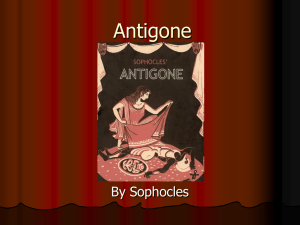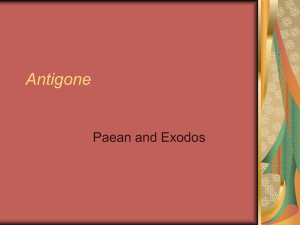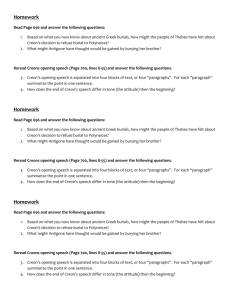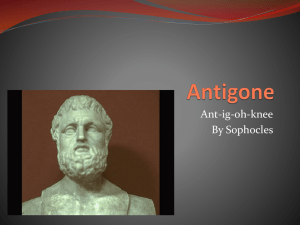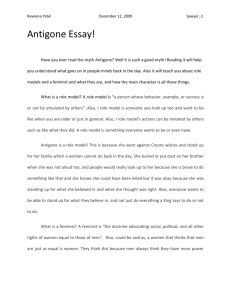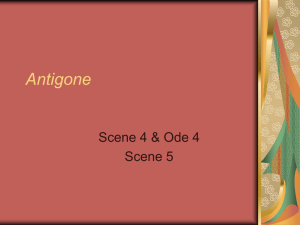Antigone vs Creon
advertisement
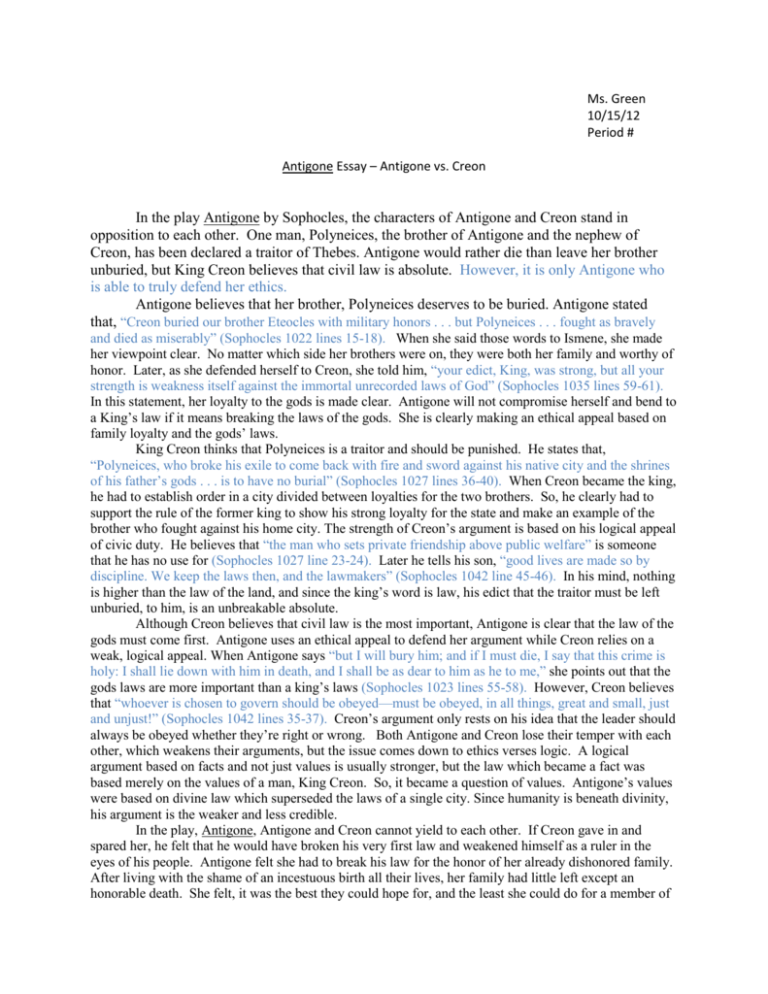
Ms. Green 10/15/12 Period # Antigone Essay – Antigone vs. Creon In the play Antigone by Sophocles, the characters of Antigone and Creon stand in opposition to each other. One man, Polyneices, the brother of Antigone and the nephew of Creon, has been declared a traitor of Thebes. Antigone would rather die than leave her brother unburied, but King Creon believes that civil law is absolute. However, it is only Antigone who is able to truly defend her ethics. Antigone believes that her brother, Polyneices deserves to be buried. Antigone stated that, “Creon buried our brother Eteocles with military honors . . . but Polyneices . . . fought as bravely and died as miserably” (Sophocles 1022 lines 15-18). When she said those words to Ismene, she made her viewpoint clear. No matter which side her brothers were on, they were both her family and worthy of honor. Later, as she defended herself to Creon, she told him, “your edict, King, was strong, but all your strength is weakness itself against the immortal unrecorded laws of God” (Sophocles 1035 lines 59-61). In this statement, her loyalty to the gods is made clear. Antigone will not compromise herself and bend to a King’s law if it means breaking the laws of the gods. She is clearly making an ethical appeal based on family loyalty and the gods’ laws. King Creon thinks that Polyneices is a traitor and should be punished. He states that, “Polyneices, who broke his exile to come back with fire and sword against his native city and the shrines of his father’s gods . . . is to have no burial” (Sophocles 1027 lines 36-40). When Creon became the king, he had to establish order in a city divided between loyalties for the two brothers. So, he clearly had to support the rule of the former king to show his strong loyalty for the state and make an example of the brother who fought against his home city. The strength of Creon’s argument is based on his logical appeal of civic duty. He believes that “the man who sets private friendship above public welfare” is someone that he has no use for (Sophocles 1027 line 23-24). Later he tells his son, “good lives are made so by discipline. We keep the laws then, and the lawmakers” (Sophocles 1042 line 45-46). In his mind, nothing is higher than the law of the land, and since the king’s word is law, his edict that the traitor must be left unburied, to him, is an unbreakable absolute. Although Creon believes that civil law is the most important, Antigone is clear that the law of the gods must come first. Antigone uses an ethical appeal to defend her argument while Creon relies on a weak, logical appeal. When Antigone says “but I will bury him; and if I must die, I say that this crime is holy: I shall lie down with him in death, and I shall be as dear to him as he to me,” she points out that the gods laws are more important than a king’s laws (Sophocles 1023 lines 55-58). However, Creon believes that “whoever is chosen to govern should be obeyed—must be obeyed, in all things, great and small, just and unjust!” (Sophocles 1042 lines 35-37). Creon’s argument only rests on his idea that the leader should always be obeyed whether they’re right or wrong. Both Antigone and Creon lose their temper with each other, which weakens their arguments, but the issue comes down to ethics verses logic. A logical argument based on facts and not just values is usually stronger, but the law which became a fact was based merely on the values of a man, King Creon. So, it became a question of values. Antigone’s values were based on divine law which superseded the laws of a single city. Since humanity is beneath divinity, his argument is the weaker and less credible. In the play, Antigone, Antigone and Creon cannot yield to each other. If Creon gave in and spared her, he felt that he would have broken his very first law and weakened himself as a ruler in the eyes of his people. Antigone felt she had to break his law for the honor of her already dishonored family. After living with the shame of an incestuous birth all their lives, her family had little left except an honorable death. She felt, it was the best they could hope for, and the least she could do for a member of her shamed family. Still, in the end, Creon found that the law of the gods was the only true absolute, and he had to give in at the end. Although Antigone’s arguments had some flaws, such as abandoning her sister for the sake of a dead brother while proclaiming family loyalty is important, her obedience to the gods showed the only true path for a moral, ancient Greek.




